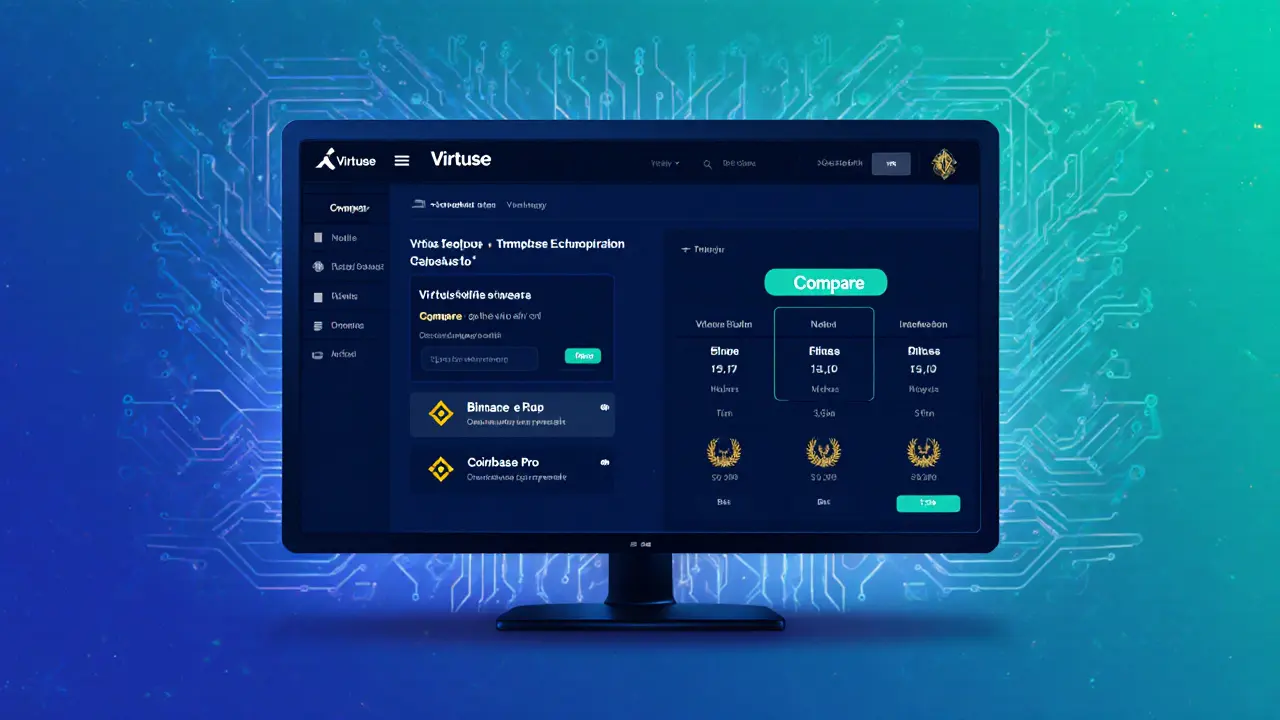Virtuse Exchange Comparison Tool
Use this tool to compare Virtuse Exchange with other major platforms like Binance and Coinbase Pro based on key features important for crypto investors.
| Feature | Virtuse Exchange | Binance | Coinbase Pro |
|---|---|---|---|
| EU License | Yes (EU-regulated) | No (Offshore) | Yes (US-registered) |
| Crypto Count | 10 (focus on Bitcoin) | > 5,000 | ≈ 100 |
| Mobile App | No | Yes (iOS/Android) | Yes (iOS/Android) |
| Cold-Storage Ratio | ≈ 99% | ≈ 95% | ≈ 98% |
| Recurring DCA | Yes (≥ $50) | No native | No native |
| VIRTU Token Benefits | Reduced fees + staking | None | None |
Key Takeaways
- Virtuse Exchange is EU‑licensed, focuses on Bitcoin wealth management, and offers both a beginner‑friendly and a pro trading interface.
- Security is strong - about 99% of funds sit in cold storage with multi‑signature custodians.
- Fees are competitive for VIRTU token holders, but exact tiers are not publicly disclosed.
- No native mobile app yet, which puts it behind most big‑name rivals.
- Best suited for European high‑net‑worth investors who want a regulated Bitcoin‑centric platform.
When you search for a Virtuse Exchange review, you’re probably trying to decide whether this niche platform can meet your trading or long‑term crypto goals. Launched in May2019, the exchange has grown from a simple Bitcoin broker into a dual‑interface trading hub with a dedicated wealth‑management wing. Below we break down everything you need to know - from licensing and security to fees, features, and how it stacks up against the market’s heavyweights.
What Is Virtuse Exchange?
Virtuse Exchange is a Europe‑registered cryptocurrency trading platform that also offers Bitcoin‑focused wealth management services. Headquartered in the EU with an operational office in Singapore, Virtuse positions itself as “the largest Bitcoin wealth management platform in Europe”. It holds a licensed virtual currency exchange and wallet service status, meaning it must comply with EU‑wide KYC/AML rules.
Regulatory Backbone - Why European Licensing Matters
The exchange’s licence comes from the European Union, giving it a regulatory edge over many offshore firms that operate without oversight. This means users benefit from stronger consumer protection, clearer dispute‑resolution pathways, and mandatory segregation of client funds. The platform also partners with leading online verification providers to keep KYC and AML processes up‑to‑date.
Security: Cold Storage, Multi‑Signature, and Custody
Security is the cornerstone of Virtuse’s offering. Roughly 99% of user balances are kept in cold wallets managed by a top‑tier licensed custodian that employs multi‑signature technology. In practice, this means that no single key can move funds, dramatically reducing the risk of hacks. Additionally, two‑factor authentication (2FA) is mandatory for all account logins, and the platform runs regular penetration testing to spot vulnerabilities early.
Trading Interfaces - VEX Basic vs. VEX Pro
Virtuse provides two distinct front‑ends:
- VEX Basic - a clean, drag‑and‑drop layout designed for newcomers. It shows a simple price ticker, quick‑buy buttons, and a limited set of order types (market and limit).
- VEX Pro - a richer charting environment for seasoned traders. Features include candlestick charts, order‑book depth, stop‑loss / take‑profit orders, and integration with external APIs for algorithmic strategies.
Both interfaces share the same underlying account and security model, so you can start on VEX Basic and graduate to VEX Pro without opening a new account.
Virtuse Wealth - Bitcoin‑Centric Portfolio Management
Beyond spot trading, Virtuse offers Virtuse Wealth, a service aimed at high‑net‑worth individuals, families, and institutional investors. The service bundles Bitcoin accumulation strategies, periodic rebalancing, and custodial reporting. Clients can set up recurring purchases as low as $50 per month, using dollar‑cost averaging (DCA) to smooth out volatility over time.

Supported Assets - Focused Yet Growing
The exchange lists ten crypto assets for direct trade: Bitcoin (BTC), Ethereum (ETH), Ripple (XRP), Litecoin (LTC), Monero (XMR), Tether (USDT), Gemini Dollar (GUSD), Paxos Standard (PAX), PAX Gold (PAXG), and the native VIRTU token. The VIRTU token grants fee discounts and staking rewards, though the exact discount percentages are not publicly disclosed. Tokenized commodities and real‑world equities were part of the catalog early on but were removed in 2024 to tighten compliance.
Fiat On‑Ramps - SEPA and Global Currencies
Virtuse supports a fiat gateway that accepts over 20 local currencies via credit‑card processing and SEPA (Single Euro Payments Area) bank transfers. This makes it simple for European users to fund accounts directly in euros, pounds, or Swiss francs, and then convert to crypto with just a few clicks.
Fees and VIRTU Token Benefits
Fee transparency is a mixed bag. The public fee schedule lists a flat 0.25% taker fee for standard users, but VIRTU token holders enjoy lower rates - usually around 0.15% - plus a share of staking yields. Withdrawal fees are modest for major coins (e.g., 0.0005BTC), but the exchange does not publish a detailed schedule for every asset, so you’ll need to check the dashboard before trading.
How Does Virtuse Stack Up?
| Feature | Virtuse Exchange | Binance | Coinbase Pro |
|---|---|---|---|
| EU License | Yes (EU‑regulated) | No (Offshore) | Yes (US‑registered) |
| Crypto Count | 10 (focus on Bitcoin) | > 5,000 | ≈ 100 |
| Mobile App | No | Yes (iOS/Android) | Yes (iOS/Android) |
| Cold‑Storage Ratio | ≈ 99% | ≈ 95% | ≈ 98% |
| Recurring DCA | Yes (≥ $50) | No native | No native |
| VIRTU Token Benefits | Reduced fees + staking | None | None |
Pros & Cons - The Quick Checklist
- Pros:
- Regulated EU license gives legal certainty.
- High cold‑storage ratio and multi‑signature custody.
- Specialized Bitcoin wealth‑management tools.
- Recurring DCA feature for systematic investing.
- Fee discounts for VIRTU token holders.
- Cons:
- Limited crypto selection compared to major exchanges.
- No native mobile app - desktop‑only experience.
- User base is relatively small; community discussion is sparse.
- Fee schedule lacks full public granularity.
Who Should Choose Virtuse?
If you’re a European investor who values regulatory compliance, wants to lock in Bitcoin as a long‑term store of value, and appreciates a clean desktop interface, Virtuse is a solid pick. Institutional clients looking for a custodian‑backed Bitcoin fund will also find the Virtuse Wealth service useful. On the flip side, if you need a broad altcoin portfolio, a mobile trading app, or the deepest liquidity, a larger exchange like Binance or Coinbase Pro may serve you better.
Final Verdict
Virtuse Exchange fills a niche that many big exchanges ignore: a regulated, Bitcoin‑centric wealth‑management platform built for the European market. Its security and compliance credentials are hard to beat, and the recurring DCA tool makes it friendly for investors who prefer set‑and‑forget strategies. However, the lack of a mobile app and a limited crypto roster keep the platform from being a one‑stop shop for active traders. In short, treat Virtuse as a specialized vault for Bitcoin and a trusted gateway for high‑net‑worth investors, not a general‑purpose crypto marketplace.

Frequently Asked Questions
Is Virtuse Exchange safe for my funds?
Yes. Around 99% of user assets are stored in cold wallets protected by a licensed custodian using multi‑signature technology. The platform also mandates 2FA and complies with EU KYC/AML regulations.
Can I trade altcoins on Virtuse?
The exchange lists ten assets, including Bitcoin, Ethereum, and a handful of stablecoins. If you need a broader selection, you’ll have to use another platform.
What is the VIRTU token and why should I hold it?
VIRTU is Virtuse’s native utility token. Holding it grants lower trading fees (typically 0.15% vs. 0.25% for non‑holders) and eligibility for staking rewards, though exact rates are disclosed only inside the user dashboard.
Does Virtuse support fiat deposits in my local currency?
Yes. The platform’s fiat gateway accepts more than 20 currencies, including EUR, GBP, CHF, and others, via SEPA bank transfers and credit‑card purchases.
Is there a mobile app for Virtuse Exchange?
No, Virtuse currently offers a web‑only experience. Mobile‑friendly browsers work, but there’s no native iOS or Android application.


21 Responses
Wow, the cold‑storage ratio of ≈99% is impressive! 🚀 Security is the bedrock of any exchange, and Virtuse’s multi‑signature custodian adds that extra shield you need!!! Remember, regulators love transparency, so keep that KYC crisp, even if it feels like a headache 😅. If you’re thinking about long‑term Bitcoin wealth, this platform really vibes with the “store‑of‑value” mindset!!!
Sure, because we all love a regulator that actually does something, right?
Reading through the Virtuse Exchange review, the first thing that strikes me is the dedication to regulatory compliance, which is a rarity in the crypto space. The EU license provides a layer of consumer protection that many offshore platforms simply cannot match, and that should give European investors a sense of security. Security-wise, the claim of roughly 99% of assets in cold storage, backed by multi‑signature custodians, aligns with best‑in‑class custodial practices seen in traditional finance. The mandatory two‑factor authentication adds another barrier against unauthorized access, a detail that cannot be overstated. While the platform’s focus on Bitcoin and a limited asset list may seem narrow, it also reflects a strategic decision to specialize rather than dilute resources across hundreds of tokens. The VEX Basic and VEX Pro interfaces offer a clear upgrade path for users, allowing newcomers to start simple and later transition to advanced charting without opening a new account. Recurring DCA options with a low $50 minimum make systematic investing accessible, which is particularly appealing for long‑term wealth accumulation strategies. The VIRTU token’s fee‑discount mechanism, though not fully disclosed, introduces an incentive for token holders to stay engaged with the ecosystem. Fee transparency could be improved, but the baseline taker fee of 0.25% is competitive, especially when compared to the higher fees of some rival platforms. The fiat on‑ramp supporting over 20 currencies via SEPA and credit cards is a strong convenience feature for European users. Absence of a native mobile app is a notable drawback, yet the responsive web design mitigates this limitation to some extent. Custodial reporting for institutional clients adds another layer of credibility, positioning Virtuse as a potential partner for family offices and wealth managers. The limited crypto selection may deter active traders seeking altcoin exposure, but for a Bitcoin‑centric portfolio it offers a clean, focused environment. Overall, the platform’s strengths in compliance, security, and wealth‑management tools create a compelling proposition for its target audience. In conclusion, if you value regulatory oversight and a Bitcoin‑first approach, Virtuse Exchange is worth serious consideration.
The regulated status alone makes me feel a bit safer.
Even though you keep it short, I totally get where you’re coming from-knowing there’s EU oversight does calm the nerves a bit, especially when you’re new to crypto.
Look, Europe’s got better rules than some of the offshore havens, so we should be proud that Virtuse actually follows them, not some shady offshore scam.
While we agree on the importance of regulations, it’s also worth noting that strict compliance can sometimes slow down innovation, so users should balance safety with flexibility.
Ah, the elegance of a platform that dares to prioritize Bitcoin above all else-truly a renaissance of sober financial virtue!!! Yet, one must question whether such exclusivity may alienate the broader crypto community seeking diversification.
Oh please, like focusing on Bitcoin makes you “high‑brow”-the market loves variety, and anyone who dismisses altcoins is just living in the past, isn’t that cute?
I’m really curious about how the DCA feature works-does it allow automatic monthly purchases? 🤔 Let’s hope the UI makes it painless for newcomers.
Indeed, the DCA mechanism can be a game‑changer for disciplined investors, automating the acquisition process while smoothing out volatility, and when combined with the platform’s robust custodial safeguards, it forms a compelling synergy for long‑term wealth building.
From a compliance perspective, Virtuse adheres to AML/KYC protocols, which mitigates regulatory risk and aligns with EU MiCA guidelines.
Behold, the Dawn of a Bitcoin‑Centric Empire, where the few shall rise and the many shall follow, guided by the ironclad chains of security and the luminous glow of regulated order!
While the poetic flourish is entertaining, the actual market data shows that limiting yourself to ten assets can severely constrain portfolio efficiency, especially when other exchanges provide exponential diversification opportunities.
Great points all around-if you’re looking for a regulated vault for Bitcoin, Virtuse seems solid, but if you need broader options, it might be wise to supplement with another platform.
Sounds like a good choice for people who want a safe place for Bitcoin without the hassle of too many coins.
Oh wow, only ten coins? That's practically a boutique shop. 🙄
Although the limited selection may appear restrictive, it also reduces exposure to poorly vetted tokens, thereby enhancing overall portfolio security for risk‑averse investors.
Given the platform’s EU licensing and impressive cold‑storage ratio, I would recommend it to high‑net‑worth clients seeking a compliant, Bitcoin‑focused solution-indeed, it aligns with fiduciary standards.
The discourse surrounding Virtuse’s regulatory posture uncovers a layered narrative that intersects legal compliance, market liquidity, and investor psychology; on one hand, the EU license furnishes a robust framework that can engender trust among institutional participants, while on the other, the narrowed asset repertoire may curtail speculative opportunities that are prevalent on more expansive exchanges. Moreover, the absence of a native mobile application introduces a friction point that could impede user adoption, particularly among the younger demographic that favors on‑the‑go trading. Nevertheless, the platform’s dedication to cold‑storage best practices and multi‑signature custodial solutions cannot be understated, as these mechanisms significantly mitigate custodial risk-a paramount concern in the crypto ecosystem. Consequently, for investors whose primary objective is to accumulate and preserve Bitcoin wealth within a regulated environment, Virtuse presents a compelling value proposition, albeit with the caveat that diversification and mobile accessibility remain areas for future enhancement.
All things considered, Virtuse offers a solid foundation for Bitcoin investors, but keep an eye on upcoming features before committing fully.